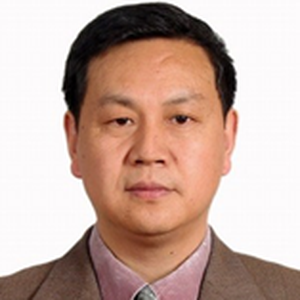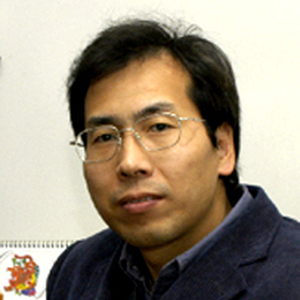
Han Ding
Professor at Huazhong University of Science and TechnologyDING HAN is a professor of mechanical engineering in Huazhong University,China.Prof. Ding Han, an expert in mechanical engineering, was born in August 1963 in Zongyang, Anhui. Prof. Ding is the dean of School of Mechanical Science and Engineering, and the director of State Key Laboratory of Digital Manufacturing and Equipment Technology. In 2013, he was elected as a member of Chinese Academy of Sciences. Prof. Ding received his bachelor degree of Automobile Manufacture from Xi’an Highway Scientific Academy (now Chang’an University) in 1982, master degree of Mechanical Manufacturing and Automation from Wuhan University of Technology in 1985, and Ph.D. degree from Huazhong University of Science and Technology (HUST) in 1989. Then, he worked in HUST until now. Supported by Alexander von Humboldt Foundation, he visited the University of Stuttgart (Germany) from 1993 to 1994. Then, he visited the School of Electrical and Electronic Engineering, Nanyang Technological University (Singapore) from 1994 to 1996. He obtained the National Natural Science Funds for Distinguished Young Scholar in 1997, and was employed as the “Cheung Kong” Chair Professor in 2001. He has been appointed as the leading scientist for National 973 Program twice in 2005 and 2011. Prof. Ding is a conference editorial board committee member of IEEE International Conference on Robotics and Automation from 2011 to 2012. He also acted as an associate editor (2003-2007) and an editor (2011-) of IEEE Transactions on Automation Science and Engineering. He has worked as a technical editor of IEEE/ASME Transactions on Mechatronics from 2010 until now. Prof. Ding has dedicated himself to the research in the field of digital manufacturing for a long time, and has successfully combined the robotics and manufacturing technologies together. He proposed the theory of complex surfaces machining with high strip widths, explored the error propagation mechanism hidden in the interior of “tool motion – cutter envelop – machining error”. Prof. Ding has established the full-discretization method for prediction of machining stability to ensure high-performance machining without chatter vibrations. Moreover, he presented a robotic motion planning method, and developed a “Measuring-Manipulating-Machining (3M)” system for grinding of large blades. His research results have been applied in the aerospace, energy and automobile fields, which have yielded remarkable economic profits. Prof. Ding has published three academic books and more than 150 SCI journal papers, and licensed more than 20 patents in China. He has received 2nd-class prize of the National Natural Science Award, and 2nd/3rd-class prize of the National Science and Technology Progress Award twice/once.

Svanberg Sune
Professor at University of LUNDSune Svanberg was born in 1943 in Trollhättan, Sweden, Swedish Citizen. He received his PhD in the field of atomic resonance spectroscopy in 1972 at Gothenburg University, Sweden. After a post-doc year at Columbia University, New York and initial work on atomic laser spectroscopy, he continued laser-based spectroscopy at Chalmers in Gothenburg up till 1980, when he became professor and head of the Atomic Physics Division at Lund Institute of Technology (technical faculty at Lund University) up till 2008. In 1995 he was appointed as director of the newly established Lund Laser Center. He remained its director until 2010, and continued as Senior Professor at the center. Since 2011 he has been a Distinguished Professor at the South China Normal University, Guangzhou, China. He is a member of 6 scientific academies: Royal Swedish Academy of Sciences (and during 10 years a member of its Nobel Committee for Physics; two years as chairman), Royal Swedish Academy of Engineering Sciences, Royal Society of Sciences, Académie Royal de Belgique, Lithuanian Academy of Science, and the Third World Academy of Sciences. He is Fellow of the American Physical Society (APS), Optical Society (OSA), European Optical Society, SPIE and the Electromagnetic Academy. He became honorary doctor/professor at 8 universities, including Jilin University, Harbin Institute of Technology and Zhejiang University. He was the recipient of the first European Physical Society Quantum Electronics Prize (1996) and recipient of the first Azko Nobel Science Award (1999). In 2004 he was awarded the SKAPA Innovation Prize, in 2005 the W.E. Lamb Medal, in 2006 the Celsius Gold Medal (Uppsala), in 2009 the Memorial Gold Medal (Lund) and the V.K. Zworykin Award of the International Federation of Medical and Biological Engineering, in 2010 the Adelskold Medal of the Royal Academy of Sciences and the Large Gold Medal from the Royal Academy of Engineering Sciences, Stockholm, and in 2012 the Gold Medal of His Majesty the King of Sweden. He is an "Einstein Professor" of the Chinese Academy of Sciences since 2006, and received China´s highest distinction for non-Chinese, the China Friendship Award in 2013, and became Honorary Citizen of Guangzhou in 2015.
He serves on numerous international conference-, evaluation- and advisory committees. He has supervised a large number of graduate students to their PhD in Physics. Being the co-author of more than 650 scientific papers and around 40 patents and patent applications, he had scientific collaboration with major international companies and helped in the formation of several spin-off companies. He worked extensively with physicists in developing countries, and helped arrange hands-on workshops where realistic equipment related to medicine, environment and agriculture was introduced.

Behdinan Kamran
Professor at University of TORONTODr. Kamran Behdinan, earned his Ph.D in Mechanical Engineering from the University of Victoria in British Columbia in 1996, and has a considerable experience in both academic and industrial settings. Kamran was appointed to the academic staff of Ryerson University in 1998, tenured and promoted to the level of associate professor in 2002 and subsequently to the level of Professor in 2007 and served as the director of the aerospace engineering program (02-03), and the founding Chair of the newly established Department of Aerospace Engineering (07/2003 – 07/2011). Kamran was a founding member and the Executive Director of the Ryerson Institute for Aerospace Design and Innovation (2003-2011). He was also a founding member and the coordinator of the Canadian-European Graduate Student Exchange Program in Aerospace Engineering at Ryerson University. Dr. Behdinan held the NSERC Design Chair in “Engineering Design and Innovation”, 2010-2012, sponsored by Bombardier Aerospace and Pratt and Whitney Canada. Dr. Behdinan joined the Department of Mechanical and Industrial Engineering, University of Toronto, in the rank of Full Professor in September 2011. He is the NSERC Design Chair in “Multidisciplinary Design and Innovation – UT IMDI”, sponsored by NSERC, University of Toronto, and thirteen companies including Bombardier Aerospace, Pratt and Whitney Canada, United Technology Aerospace Systems, Magna International, Honeywell, SPP Canada Aircraft, Ford, and DRDC Toronto. He is the founding director of the “University of Toronto Institute for Multidisciplinary Design and Innovation”, an industry-centred project-based learning institute in partnership with major aerospace and automotive companies.
Dr. Behdinan is the past President of the Canadian Society of Mechanical Engineering (CSME), served as a member of the technical and scholarship committees of the High Performance Computing Virtual Laboratory (HPCVL) and a member of the Design Division of the Canadian Aeronautics and Space Institute (CASI). He is the founding director and principal investigator of the University of Toronto, Department of Mechanical and Industrial Engineering “Advanced Research Laboratory for Multifunctional Lightweight Structures”, funded by the Canadian Foundation for Innovation (Leader’s Opportunity Fund) and Ontario Research Fund. His research interests include Design and Development of Light-Weight Structures for aerospace, automotive, and nuclear applications, Multidisciplinary Design Optimization of Aerospace and Automotive systems, Multi-scale Simulation of Nano-structured Materials and Composites. He has supervised 28 PhDs, 110 Masters’, and 34 Post-Doctoral Fellows and Scholars. He has also published more than 330 peer-reviewed Journal and Conference papers, and 9 book chapters. He has been the recipient of many prestigious awards and recognitions such as the Research Fellow of Pratt and Whitney Canada and Fellows of the CSME, ASME, the Canadian Academy of Engineering, EIC, AAAS, as well as Associate Fellow of AIAA.

Kai Cheng
Professor at Brunel UniversityProfessor Kai Cheng is the head of AMEE. He is engaged in the research of ultra-precision machining and micro and nano manufacturing technology. His main research interests include intelligent tools, high precision and high speed electric spindles, multi-scale integrated design theory and methods for ultra-precision machine tools, machine tool accuracy testing and evaluation methods, and low carbon manufacturing. Prof. Cheng has done in-depth research work on hydrostatic bearing design theory and precision machining applications. Now he is the member of Institution of Engineering and Technology and Institution of Mechanical Engineers.

Wen He Liao
Professor at Nanjing University of Science and TechnologyProfessor of Nanjing University of Science and Technology. He has long been engaged in teaching and scientific research on the overall design of microsatellite, digital design and manufacturing technology foundation of aerospace products. He has presided over and completed more than 20 major scientific research projects at national/provincial and ministerial levels, and his team has successfully developed and launched the first stealth microsatellite and five CubeSats in China. He has won one National Science and Technology Progress Award, one National Science and Technology Progress Award, and 10 Provincial Science and Technology Progress Awards. He has published more than 300 papers, 2 monographs and 50 patents and software copyrights.

Weibiao Chen
Director of The Institute at Nanjing Insititute of Advanced Laser TechnologyChen weibiao , Ph.D. in Physics from Ocean University of China, conducted his Ph.D. research at Colorado State University in 1995 and postdoctoral research at Chiba University in Japan from 1998 to 2000. he was selected as one of the 100 People Program of Chinese Academy of Sciences in 2000, and is now a researcher and director of Advanced Laser and Applied Systems Laboratory, Shanghai Institute of Optics and Fine Mechanics. He is also the Secretary of Shanghai Society of Infrared and Remote Sensing. He is mainly engaged in the research of laser remote sensing and space all-solid-state laser technology, focusing on the basic research on the application of laser remote sensing and telemetry technology in space, atmosphere and ocean. He undertakes research on national topics such as space all-solid-state lasers, Doppler lidar, and ocean exploration lidar.